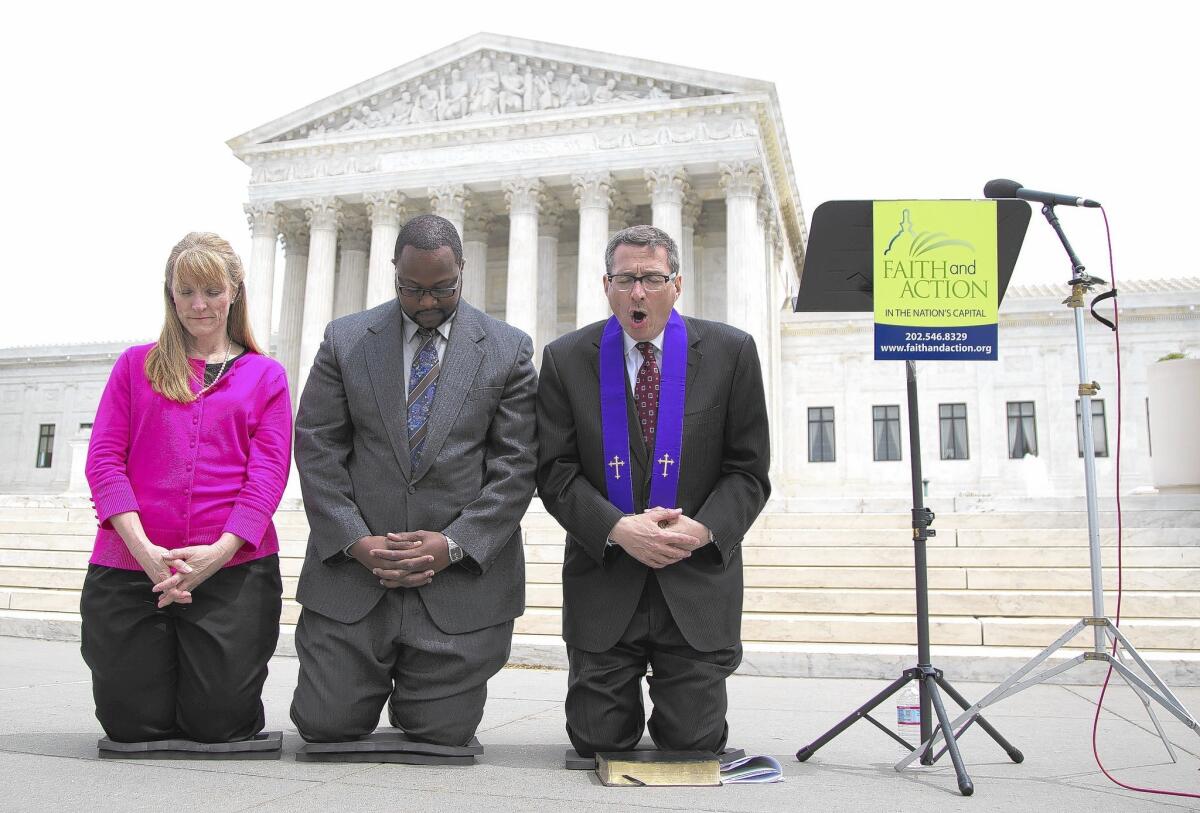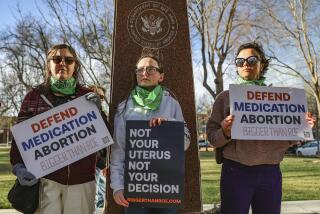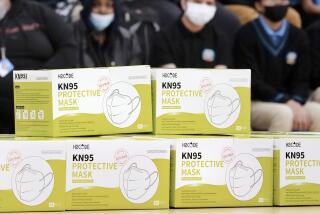Supreme Court ruling tilts law to the right on public prayer

Reporting from WASHINGTON — A Supreme Court divided along both ideological and religious lines cleared the way Monday for local officials to open public meetings with explicitly Christian prayers, ruling that the Constitution does not require government-sponsored religious invocations to be “addressed only to a generic God.”
The 5-4 opinion puts the court’s stamp of approval on a trend in conservative communities to include more overtly religious references in public meetings.
It is also likely to be read as implicitly sanctioning Christian and other religious displays on public property, including Christmas trees and Nativity scenes during the holiday season.
For decades, the court has been closely split on the proper role of religion in government settings. Monday’s opinion tilts the law to the right and gives local officials considerably more freedom.
Justices rejected the idea — which had prevailed in previous rulings — that official invocations should be limited to “nonsectarian” references, such as the “Almighty” or “Heavenly Father.” Rather, the court said Christian clerics may be invited to deliver prayers that invoke the name of Jesus Christ so long as no one is forced to join in saying the prayer.
Justice Anthony M. Kennedy, who spoke for the court’s conservative majority, said those who “feel excluded or disrespected” by such religious invocations could simply ignore them. “Adults often encounter speech they find disagreeable,” he said.
Throughout American history, he added, “ceremonial prayer” has been a regular part of public gatherings. Judges may not act as “censors of religious speech” by telling government officials that they’ve crossed the line by permitting Christian messages.
The dissenters, led by Justice Elena Kagan, said the court had crossed a line by approving a policy of “religious favoritism.” She said the majority might view the case differently if a “mostly Muslim town” decided to open its meetings with Muslim prayers or a Jewish community always invited a rabbi to open its official proceedings.
“When the citizens of this country approach their government, they do so only as Americans, not as members of one faith or other,” she wrote. “They should not confront government-sponsored worship that divides them along religious lines.”
The five justices in the majority — Kennedy, Chief Justice John G. Roberts Jr. and Justices Antonin Scalia, Clarence Thomas and Samuel A. Alito Jr. — are Catholic. Three of the four dissenters — Kagan and Justices Ruth Bader Ginsburg and Stephen G. Breyer — are Jewish. The fourth, Justice Sonia Sotomayor, was raised Catholic but is not a regular churchgoer.
The case began when a town supervisor in Greece, N.Y., near Rochester, decided to invite local clerics to open the town’s monthly meetings with a prayer. Between 1999 and 2007, all of the participating ministers were Christian.
Two residents who regularly attended the meetings, Susan Galloway, who is Jewish, and Linda Stephens, who is not religious, complained to the supervisor and then filed suit. They contended the town’s policy of sponsoring Christian prayers violated the 1st Amendment’s ban on an “establishment of religion.”
No one disputed that the town could open its meetings with a religious invocation. The Supreme Court in 1983 upheld legislative prayers in a Nebraska case. But it was unclear whether such official prayers could invoke Jesus Christ.
The U.S. 2nd Circuit Court of Appeals ruled in 2012 that the Greece town council had gone too far, citing the “steady drumbeat” of Christian prayers.
That decision relied heavily on the opinions of former Justice Sandra Day O’Connor, who helped forge a previous majority around the idea that the government may not endorse or favor any particular religion.
But the current Supreme Court reversed the 2nd Circuit ruling and rejected the lawsuit. Ceremonial prayers are constitutional, Kennedy said, so long as they do not “denigrate nonbelievers or religious minorities, threaten damnation or preach conversion.”
Thomas would have gone further and said the 1st Amendment does not forbid states or cities from establishing an official religion. Thomas says the 1st Amendment, when it was adopted, limited only the federal government.
Though the case involved a town council, the ruling applies to all levels of government, including state and county boards.
The Alliance Defending Freedom, an Arizona-based religious rights group that defended the town, said the ruling had “affirmed again that Americans are free to pray. Speech censors should have no power to silence volunteers who pray for their communities just as the founders did,” said David Cortman, a senior counsel for the group.
Americans United for Separation of Church and State, a Washington-based advocacy group that represented Galloway and Stephens, said it was disappointed. “The Supreme Court just relegated millions of Americans — both believers and nonbelievers — to second-class citizenship,” said the Rev. Barry Lynn, the group’s executive director. “Now all who attend meetings of their local boards could be subjected to the religion of the majority.”
Bill Reilich, town supervisor of Greece, said Monday that the prayer practice would continue and that anyone who wanted to come and offer a prayer could do so.
“It’s freedom of speech,” Reilich said at a news conference. “It’s beyond even religion. It’s reaffirming what our country was founded on. It’s much bigger than the town of Greece.”
Times staff writer Tina Susman in New York contributed to this report.
More to Read
Sign up for Essential California
The most important California stories and recommendations in your inbox every morning.
You may occasionally receive promotional content from the Los Angeles Times.











